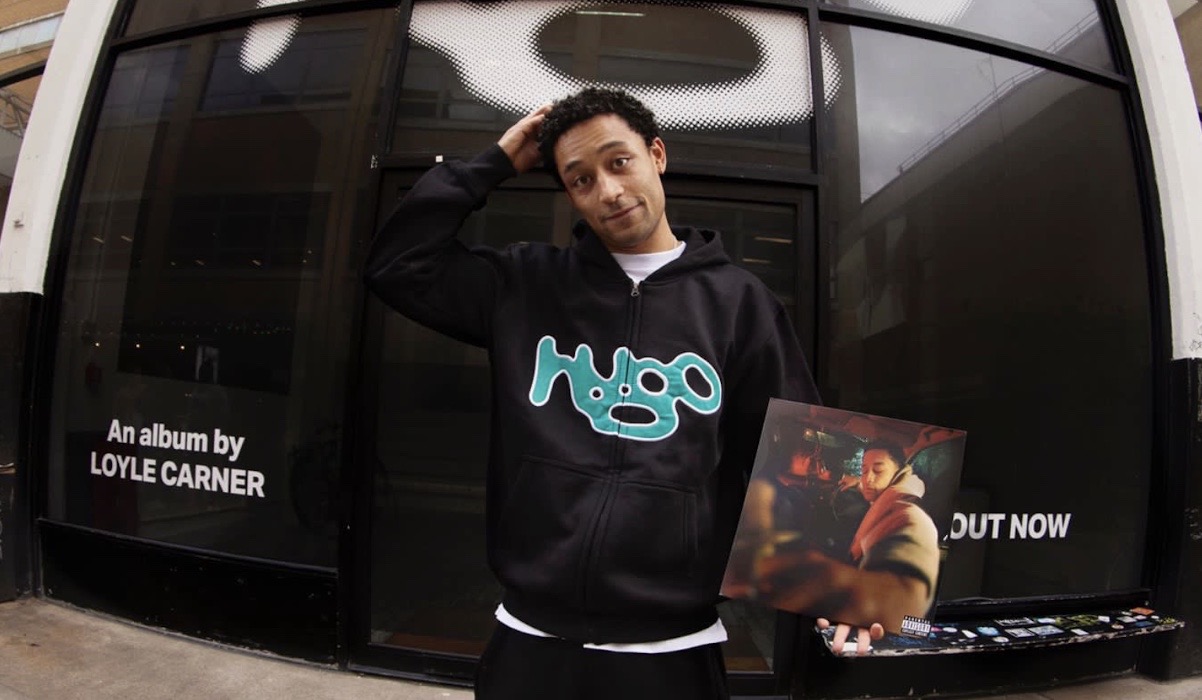hugo review: No More Mr. Nice Guy – Fatherhood, Kendrick, and politics speckle Loyle Carner’s most mature album yet
Owen Frost dissects Loyle Carner’s third studio album, ‘hugo’.

Image Credits: @loylecarner on Twitter
Known for his jazz-concocted beats and infectious flows, Loyle Carner has returned after a long period of recording in the studio in lockdown. Throughout his career, Benjamin Coyle-Larner (LC) had established himself as one of the UK’s shiniest stars in rap music; his debut album in 2017 Yesterday’s Gone exemplifying a lo-fi hip hop sound. Come 2019, his sophomore effort Not Waving, But Drowning saw him expand into the mainstream with collabs with Jorja Smith and Sampha – no longer just the bedroom classics forged with Rebel Kleff; instead charted to number 3 in the UK charts.
Beginning with the title and album art, LC’s de-capitalisation of hugo enhances a warm and yet affectionate side to the rapper. The dummy and baby shoes out of focus showcase the paternalistic side to Coyle-Larner that we will get to see throughout hugo’s ten track runtime.
hugo begins with the series of successful singles Loyle released from 4th July to September 13th that are antithetical to the persona he gained across the years as the nicest guy in UK rap. These initial hits form a more banger-centred first half of the album, pushing through newer sounds and Madlib beats. ‘Hate’ is frenetic, yet carries maturity and after a full album listen, the line “the man that flew / all away from the sun [son?]” hits deeper.
‘Nobody Knows (Ladas Road)’ was the latest in the single line, accompanied by an extremely creative music video. Touted by many on LC’s Instagram as the follow-up to Coyle-Larner’s 2017 smash hit ‘Isle of Arran’, ‘Nobody Knows’ is laced with that same gospel emphasis. However, this is where the sampling selection and Kwes’ production shine, key to Loyle’s progression. The rapper’s conflicted identity is beautifully showcased, his raps fitting in between the choral “Glory” and somebody “Nobody Knows”. These two sides are explored lyrically throughout the song and album and yet, Coyle-Larner grows and explodes in confidence with the line “Without hating me” where the pause before the choir continues signals a moment of realisation. This spurs on the monopolistic “Glory” in the sample from then on underpinning his cathartic moment.
Indeed, this is LC’s most mature project to date, thanks in no doubt to his latest role as a father in 2020, but also his noticeable association with poets across the years. ‘Georgetown’ and its music video see LC return to his Guyanese roots, accompanied by seminal poet John Agard. LC as an artist has been entwined with poetry before – Not Waving, But Drowning itself was a Stevie Smith reference and the liner notes were written by Benjamin Zephaniah. The following poetically pitched banger ‘Speed of Plight’ contains the syntactical solecism “Ayo I can’t tell if it be only me”, fleshing out on a chorus alongside a magnetically muted bass.
While the later songs signal a break from the maximalism created before, Coyle-Larner isn’t afraid to wear his influences on his sleeve. ‘Plastic’ while not perhaps as catchy initially as ‘Speed of Plight’, sounds Thundercatian at times on the bass, and one I’m sure to grow into after multiple listens. I thought the slightly nasally chorus from Jnr Williams on ‘Homerton’ felt particularly Kendrick-inflected (an influence hugo doesn’t shy away from). ‘Blood on My Nikes’ and its line “heart breaks, it was common sense” harks back to one of Coyle Larner’s favourite hip hop gurus – Common. Again, the refrain “Mama, I lost a friend / … again” sounds rather like Kendrick on Mr. Morale & the Big Steppers and the ‘HGU’ line “hurt people, hurt people” seemed to refer to Kendrick’s pithy line about Will Smith on ‘The Heart Part 5’.
While ‘Father Time’ might have been the best father song of the year, (and from Mr. Morale more broadly), Coyle-Larner isn’t afraid to go in on the fatherhood references himself. In ‘Polyfilla’ he states Wolverine is the only father figure he’s seen and later in ‘HGU’ wants to “break the chains and the cycle” of a cyclical narrative of fatherhood he wishes to dispel.
We end on a final delivery. After charting a course through new paternal identity in a state that still contains vicious social stratification, the South Croydon rapper settles back into the amped up lyricism we saw begin hugo. This time the backdrop – chess. From the frantic ‘Hate’ to a quieter pensive pastime. Loyle has shown that he can deliver on a more mature level. Checkmate.
hugo is out on all streaming platforms now.
